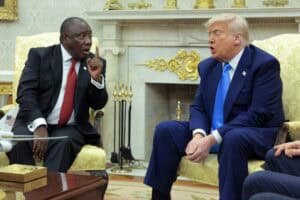Finance Minister Tito Mboweni doesn't seem to have Ramaphosa's backing, and his decisions are being hampered because alliance partners are pulling in different directions, they say.

The conflict within the ANC tripartite alliance over economic policy could put the brakes on the economy recovering from the Covid-19 devastation, experts say.
Participants in an online discussion, hosted by the think tank platform of the North West University Business School, were clear that Finance Minister Tito Mboweni’s decisions were hampered because alliance partners were pulling in different directions.
Chief economist at Econometrix Azar Jammine was concerned that Mboweni had announced cutbacks in public expenditure without giving details.
He said there was no promise of cutting the public wage bill due to fear of a backlash from public sector unions, who were already angry that the government had reneged on its three-year wage increase deal, agreed upon in 2018.
Political analyst Piet Croucamp questioned if Mboweni had the support of President Cyril Ramaphosa in the supplementary budget he presented in parliament on Wednesday.
Croucamp said, unlike former minister Trevor Manuel who had the full backing of former presidents Thabo Mbeki and Nelson Mandela and did as he pleased when it came to budgets, Mboweni appeared to be timid.
The fact that he had to convince the ANC partners and Cabinet about the crisis facing the country on his own was indicative of a man without support.
Another political analyst at the university, Andre Duvenhage, said when Covid-19 came, the country was already at the economic tipping point.
He said the country needed more political direction and a lot more specifics.
The conflict within the tripartite alliance and other structures was a source of economic policy impasse.
“The biggest challenge at the moment is leadership and strategic vision,” Duvenhage said. “We should identify opportunities around the current crisis and exploit them.”
Financial expert Theo Vorster said the JSE did not represent the SA economy because more than half of the businesses on it were not South African.
The market value was not determined in the country and values of big mining stocks were determined in London, rather than SA.
As there were real returns in the bond market, particularly government bonds, this was a significant area of investment.
But, Vorster said, the fact that markets reacted in a “mildly positive” way to Mboweni’s budget did not mean all was well.
For more news your way, download The Citizen’s app for iOS and Android.
Support Local Journalism
Add The Citizen as a Preferred Source on Google and follow us on Google News to see more of our trusted reporting in Google News and Top Stories.






